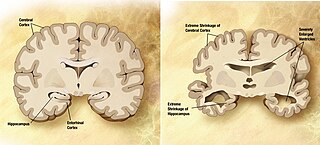
Susan Lee Lindquist, ForMemRS was an American professor of biology at MIT specializing in molecular biology, particularly the protein folding problem within a family of molecules known as heat-shock proteins, and prions. Lindquist was a member and former director of the Whitehead Institute and was awarded the National Medal of Science in 2010.
Neuropharmacology is the study of how drugs affect function in the nervous system, and the neural mechanisms through which they influence behavior. There are two main branches of neuropharmacology: behavioral and molecular. Behavioral neuropharmacology focuses on the study of how drugs affect human behavior (neuropsychopharmacology), including the study of how drug dependence and addiction affect the human brain. Molecular neuropharmacology involves the study of neurons and their neurochemical interactions, with the overall goal of developing drugs that have beneficial effects on neurological function. Both of these fields are closely connected, since both are concerned with the interactions of neurotransmitters, neuropeptides, neurohormones, neuromodulators, enzymes, second messengers, co-transporters, ion channels, and receptor proteins in the central and peripheral nervous systems. Studying these interactions, researchers are developing drugs to treat many different neurological disorders, including pain, neurodegenerative diseases such as Parkinson's disease and Alzheimer's disease, psychological disorders, addiction, and many others.

A neurodegenerative disease is caused by the progressive loss of neurons, in the process known as neurodegeneration. Neuronal damage may also ultimately result in their death. Neurodegenerative diseases include amyotrophic lateral sclerosis, multiple sclerosis, Parkinson's disease, Alzheimer's disease, Huntington's disease, multiple system atrophy, tauopathies, and prion diseases. Neurodegeneration can be found in the brain at many different levels of neuronal circuitry, ranging from molecular to systemic. Because there is no known way to reverse the progressive degeneration of neurons, these diseases are considered to be incurable; however research has shown that the two major contributing factors to neurodegeneration are oxidative stress and inflammation. Biomedical research has revealed many similarities between these diseases at the subcellular level, including atypical protein assemblies and induced cell death. These similarities suggest that therapeutic advances against one neurodegenerative disease might ameliorate other diseases as well.

Gregory A. Petsko is an American biochemist and member of the National Academy of Sciences, the National Academy of Medicine, the American Academy of Arts and Sciences, and the American Philosophical Society. He is currently Professor of Neurology at the Ann Romney Center for Neurologic Diseases at Harvard Medical School and Brigham and Women's Hospital. He formerly had an endowed professorship in Neurology and Neuroscience at Weill Cornell Medical College and is still an adjunct professor of Biomedical Engineering at Cornell University, and is also the Gyula and Katica Tauber Professor, Emeritus, in biochemistry and chemistry at Brandeis University. On October 24, 2023, in a ceremony in the East Room of the White House, President Joe Biden presented Gregory Petsko and eight others with the National Medal of Science, the highest honor the United States can bestow on a scientist and engineer.
The Wiley Prize in Biomedical Sciences is intended to recognize breakthrough research in pure or applied life science research that is distinguished by its excellence, originality and impact on our understanding of biological systems and processes. The award may recognize a specific contribution or series of contributions that demonstrate the nominee's significant leadership in the development of research concepts or their clinical application. Particular emphasis will be placed on research that champions novel approaches and challenges accepted thinking in the biomedical sciences.
Dorothee Kern, is a professor of Biochemistry at Brandeis University and former player for the East German national basketball team.

Anne Buckingham Young is an American physician and neuroscientist who has made major contributions to the study of neurodegenerative diseases, with a focus on movement disorders like Huntington's disease and Parkinson's disease. Young completed her undergraduate studies at Vassar College and earned a dual MD/PhD from Johns Hopkins Medical School. She has held faculty positions at University of Michigan and Harvard University. She became the first female chief of service at Massachusetts General Hospital when she was appointed Chief of Neurology in 1991. She retired from this role and from clinical service in 2012. She is a member of many academic societies and has won numerous awards. Young is also the only person to have been president of both the international Society for Neuroscience and the American Neurological Association.
Lorena Beese is a James B. Duke Professor of Biochemistry and Duke Cancer Institute Member. Her research involves structural mechanisms underlying DNA replication and repair, neurodegenerative diseases, cancer, and microbial pathogenesis; X-ray crystallography and cryo-electron microscopy; structure-based drug design; protein-protein and protein-nucleic acid interactions, enzyme mechanisms, chemical biology, protein structure and function.
Maria Grazia Spillantini is Professor of Molecular Neurology in the Department of Clinical Neurosciences at the University of Cambridge. She is most noted for identifying the protein alpha-synuclein as the major component of Lewy bodies, the characteristic protein deposit found in the brain in Parkinson's disease and dementia with Lewy bodies. She has also identified mutations in the MAPT gene as a heritable cause for frontotemporal dementia.
A PERK inhibitor is a small molecule compound that unlike any existing drug inhibits the expression of protein kinase RNA–like endoplasmic reticulum kinase. The inhibitor demonstrated the ability to halt brain cell death in mice with prion disease. It represents a major new pathway for drug research on brain illness, including Alzheimer's disease and Parkinson's disease. The compound works by blocking a faulty signal in brains afflicted by neurodegenerative diseases that shuts down the production of essential proteins, leaving brain cells unprotected and soon dead.

Mary Jo Ondrechen is an American chemist, educator, researcher, community leader and activist. She serves as Professor of Chemistry and Chemical Biology and Principal Investigator of the Computational Biology Research Group at Northeastern University in Boston, Massachusetts.

Virginia Man-Yee Lee is a Chinese-born American biochemist and neuroscientist who specializes in the research of Alzheimer's disease. She is the current John H. Ware 3rd Endowed Professor in Alzheimer's Research at the Department of Pathology and Laboratory Medicine, and the director of the Center for Neurodegenerative Disease Research and co-director of the Marian S. Ware Alzheimer Drug Discovery Program at the Perelman School of Medicine, University of Pennsylvania. She received the 2020 Breakthrough Prize in Life Sciences.

Giovanna Rachele Mallucci is van Geest Professor of Clinical Neurosciences at the University of Cambridge in England and associate director of the UK Dementia Research Institute at the University of Cambridge. She is a specialist in neurodegenerative diseases.
Patrick D'Silva is an Indian cell biologist, biochemist, and an associate professor at the Molecular Chaperone Lab of the Indian Institute of Science. He is known for his medical discoveries related to neurodegenerative diseases and cancer biology. The Department of Biotechnology of the Government of India awarded him the National Bioscience Award for Career Development, one of the highest Indian science awards, for his contributions to biosciences, in 2014.
Professor Pravindra Kumar is an Indian biophysicist, bioinformatician, biochemist and Professor & Former Head Department of Biosciences and Bioengineering, Indian Institute Of Technology–Roorkee (IIT–Roorkee) India. He is known for his work on protein-protein interactions, protein engineering and structure-based drug design. Prof. Pravindra Kumar's primary research interest lies in studying Bacterial enzymes and pathways involved in the degradation of toxic aromatic compounds, such as PCBs, dibenzofuran, chlorodibenzofurans, DDT, dyes, and plastics/plasticizers. He focuses particularly on oxidoreductases enzymes due to their unique ability to catalyze challenging reactions, with a special emphasis on understanding their catalytic mechanisms and structural basis for guiding protein engineering. One notable achievement of his research group is the successful engineering of dioxygenases capable of metabolizing various toxic compounds, including those found in plastics.
Jeanne A. Hardy is an American professor of biological and biophysical chemistry at the University of Massachusetts, Amherst. Her group's work is best known for designing allosteric binding sites and control elements into human proteases.

Nancy M. Bonini is an American neuroscientist and geneticist, best known for pioneering the use of Drosophila as a model organism to study neurodegeneration of the human brain. Using the Drosophila model approach, Bonini's laboratory has identified genes and pathways that are important in the development and progression of neurodegenerative diseases such as Amyotrophic lateral sclerosis, Alzheimer's disease, and Parkinson's disease, as well as aging, neural injury and regeneration, and response to environmental toxins.
Hilal Lashuel is an American-Yemeni neuroscientist and chemist, currently an associate professor at the EPFL. His research focuses on protein misfolding and aggregation in the pathogenesis of Alzheimer's and Parkinson's diseases.
Constance Joan Jeffery is an American biophysicist and an associate professor of biological sciences at the University of Illinois Chicago. She was elected a fellow of the American Association for the Advancement of Science in 2022. Jeffery is known for her work with multifunctional proteins.
Asgar Zaheer is a neuroscientist and retired Professor of Neurology at the University of Missouri at Columbia and the Emeritus Associate Professor at the University of Iowa.








